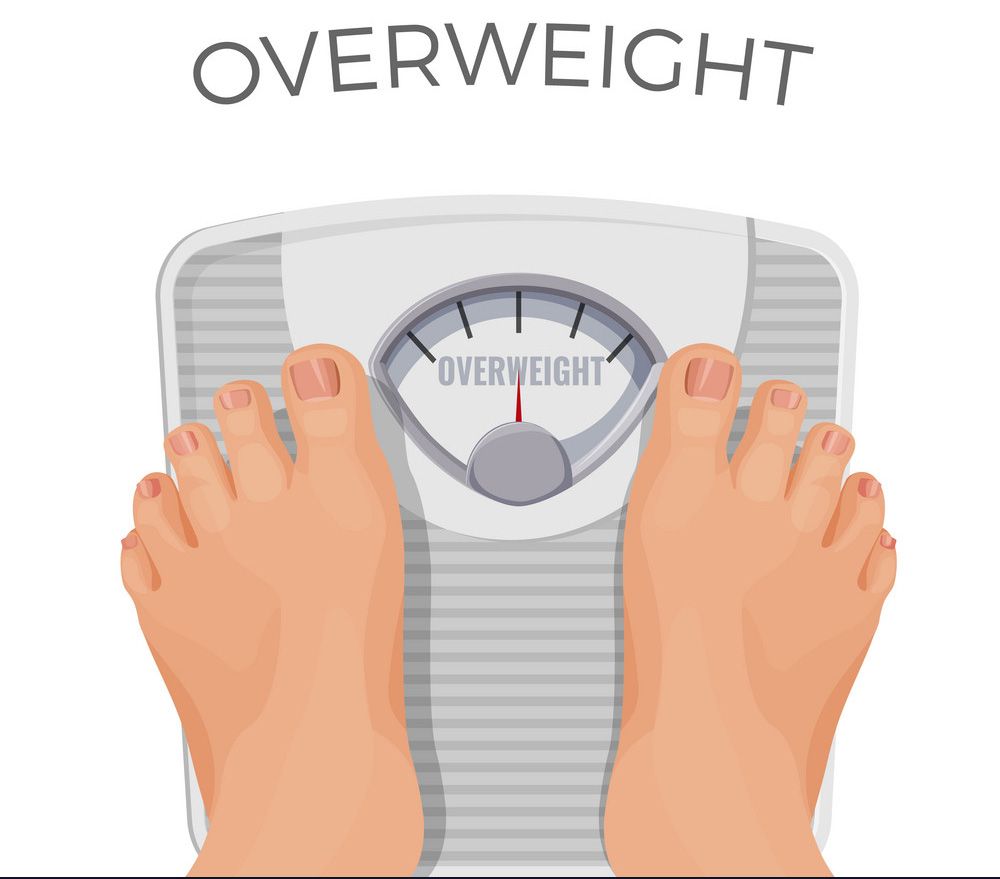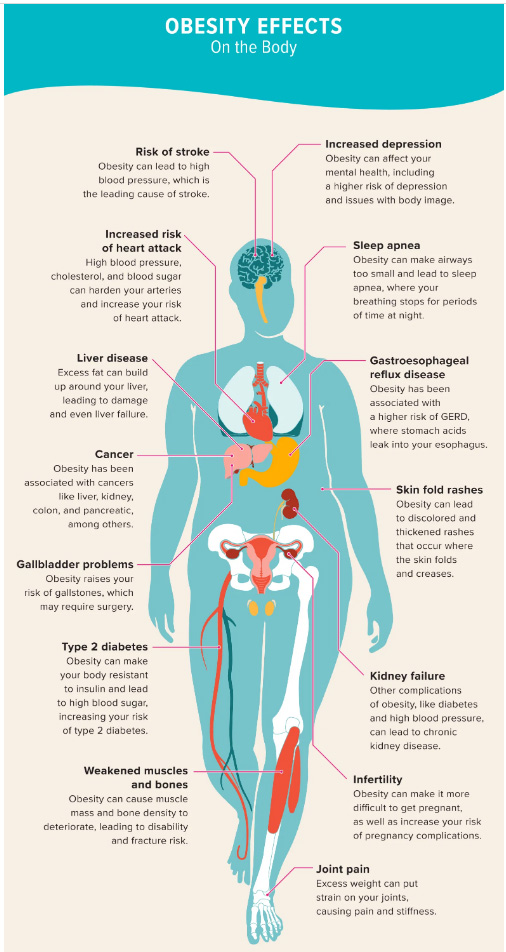Overweight and obesity may increase the risk of many health problems, including diabetes, heart disease, and certain cancers. If you are pregnant, excess weight may lead to short- and long-term health problems for you and your child.
This fact sheet tells you more about the links between excess weight and many health conditions. It also explains how reaching and maintaining a normal weight may help you and your loved ones stay healthier as you grow older.
Obesity is a condition in which a person has a harmful amount of body fat or an unhealthy distribution of body fat. It raises the risk for several serious health complications. Excess body fat puts strain on the bones and organs. It also causes complex changes in hormones and metabolism and increases inflammation in the body.
People with obesity have a body mass index (BMI) of 30 or higher. You can calculate your BMI using an online calculatorTrusted Source. You only need to know your height and weight.
Having a risk factor like obesity doesn’t mean that you’ll develop the following health problems. But it does increase your chances of developing one or more of them.

Here are 10 health risks of obesity and what you can do to prevent or manage them:
1. Type 2 diabetes
Type 2 diabetes occurs when your blood sugar is higher than normal. Over time, this can lead to other health issues, like heart disease, nerve damage, stroke, kidney disease, and vision problems.
If you have obesity, losing just 5 to 7 percent of your body weight and getting regular, moderate exercise may prevent or delay the onset of type 2 diabetes.
2. Heart disease
Heart disease is more prevalent in people with obesity. Over time, fatty deposits may accumulate in the arteries that supply the heart with blood. People with obesity have higher than normal blood pressure, low-density lipoprotein (LDL) cholesterol, triglycerides, and blood sugar, all of which contribute to heart disease.
Arteries that become narrow can lead to a heart attack. Blood clots in narrow arteries can result in a stroke.

3. Stroke
Stroke and heart disease share many of the same risk factors. Strokes occur when the blood supply to the brain is cut off. A stroke can cause damage to brain tissue and result in a range of disabilities, including speech and language impairment, weakened muscles, and changes to thinking and reasoning skills.
A 2010 review of 25 studies with almost 2.3 million participants found that obesity increased the risk of stroke by 64 percent.
4. Sleep apnea
Sleep apnea is a disorder in which someone may momentarily stop breathing during sleep.
People who are overweight and living with obesity are at a higher risk of having sleep apnea. This is because they tend to have more fat stored around the neck, making the airway shrink. A smaller airway can cause snoring and difficulty breathing at night.
Losing weight can help decrease the amount of fat in the neck and lower the risk of sleep apnea.
5. High blood pressure
Extra fat tissue in the body requires more oxygen and nutrients. Your blood vessels will need to circulate more blood to the extra fat tissue. This means your heart must work even harder to pump blood around the body.
The increase in the amount of blood circulating puts extra pressure on the walls of your arteries. This added pressure is called high blood pressure, or hypertension. Over time, high blood pressure can damage your heart and arteries.
6. Liver disease
People with obesity can develop a liver disease known as fatty liver disease or nonalcoholic steatohepatitis (NASH). This happens when excess fat builds up in the liver. The excess fat can damage the liver or cause scar tissue to grow, known as cirrhosis.
Fatty liver disease usually has no symptoms, but it can eventually lead to liver failure. The only way to reverse or manage the disease is to lose weight, exercise, and avoid drinking alcohol.
7. Gallbladder disease
The gallbladder is responsible for storing a substance known as bile and passing it to the small intestine during digestion. Bile helps you digest fats.
Obesity increases your risk of developing gallstones. Gallstones occur when bile builds up and hardens in the gallbladder. People with obesity may have higher levels of cholesterol in their bile, or have large gallbladders that don’t work well, which can lead to gallstones. Gallstones can be painful and require surgery.Eating a diet high in fiber and healthy fats may help prevent gallstones. Avoiding refined grains like white rice, bread, and pasta can also help.

8. Certain cancers
Because cancer isn’t a single disease, the association between obesity and cancer isn’t as clear as other diseases like heart disease and stroke. Still, obesity can increase your risk for certain cancers, including breast, colon, gallbladder, pancreatic, kidney, and prostate cancer, as well as cancer of the uterus, cervix, endometrium, and ovaries.
One population-based studyTrusted Source estimated that about 28,000 new cases of cancer in men and 72,000 in women in 2012 were associated with being overweight or having obesity in the United States.
9. Pregnancy complications
Pregnant women who are overweight or have obesity are more likely to develop insulin resistance, high blood sugar, and high blood pressure. This can increase the risk of complications during pregnancy and delivery, including:
- gestational diabetes
- preeclampsia
- needing a cesarean delivery (C-section)
- blood clots
- heavier bleeding than normal after delivery
- premature birth
- miscarriage
- stillbirth
- defects of the brain and spinal cord
In one study, over 60 percentTrusted Source of women with a BMI of 40 or greater when they got pregnant ended up having one of these complications. If you’re overweight or have obesity and are thinking about having a baby, you may want begin a weight management plan to avoid the above health risks. Talk to your doctor about physical activity you can safely do during pregnancy.
10. Depression
Many people affected by obesity experience depression. Some studies have found a strong correlation between obesity and major depressive disorder.
People affected by obesity may often experience discrimination based on their body size. Over time, this can lead to feelings of sadness or lack of self-worth.
Today, many advocacy groups, such as the National Association to Advance Fat Acceptance (NAAFA), are working to eliminate discrimination based on body size. These organizations provide opportunities to get involved in fighting against this discrimination. If you have obesity and are experiencing symptoms of depression, ask your doctor for a referral to a mental health counselor.

How to lower your risk
Losing as little as 5 percent of your body weight can lower your risk for several of these health conditions, including heart disease and type 2 diabetes.
A combination of diet and exercise can help you lose the weight slowly over time. There’s no need to make drastic changes to your lifestyle. The key is to be consistent and to continue making healthy choices.
For exercise, aim for at least 150 minutes a week of moderate aerobic activity. This can include a brisk walk – just 30 minutes of walking per day will help you meet this goal. Once you’ve gotten the hang of it, try increasing your exercise to 300 minutes per week. Also, try to include strengthening activities like pushups or situps into your routine at least twice a week.
A few ways to eat healthier include:
- Fill half your plate with vegetables.
- Replace unrefined grains, like white bread, pasta, and rice with whole grains like whole wheat bread, brown rice, and oatmeal.
- Eat lean sources of protein, such as lean chicken, seafood, beans, and soy.
- Cut out fried foods, fast foods, and sugary snacks.
- Avoid sugary drinks, like sodas and juice.
- Avoid alcohol.
Ask your doctor if you’re a good candidate for weight loss surgery or medications. These treatments can help you lose weight more quickly, but still require a commitment to the above lifestyle changes.
How Does Obesity Affect the Body?
Take a look at this infographic to find out how obesity affects the different areas of your body.

Nervous system
Being overweight or having obesity greatly increases the risk of stroke, where blood stops flowing to your brain. Obesity can also have a profound effect on your mental health. This includes a higher risk of depression, poor self-esteem, and issues with body image.
Respiratory system
Fat stored around the neck can make the airway too small, which can make breathing difficult at night. This is called sleep apnea. Breathing may actually stop for short periods of time in people with sleep apnea.
Digestive system
Obesity has been associated with a higher risk of gastroesophageal reflux disease (GERD). GERD occurs when stomach acid leaks into the esophagus.
In addition, obesity increases the risk of developing gallstones. This is when bile builds up and hardens in the gallbladder. This may require surgery.
Fat can also build up around the liver and lead to liver damage, scar tissues, and even liver failure.
Cardiovascular and endocrine system
In people with obesity, the heart needs to work harder to pump blood around the body. This leads to high blood pressure, or hypertension. High blood pressure is the leading cause of stroke.
Obesity can also make the body’s cells resistant to insulin. Insulin is a hormone that carries sugar from your blood to your cells, where it’s used for energy. If you’re resistant to insulin, the sugar can’t be taken up by the cells, resulting in high blood sugar.
This increases a person’s risk of having type 2 diabetes, a condition where your blood sugar is too high. Type 2 diabetes is linked to a range of other health issues, including heart disease, kidney disease, stroke, amputation, and blindness.
High blood pressure, high cholesterol, and high blood sugar on top of excess body fat can make the blood vessels that carry blood to the heart become hard and narrow. Hardened arteries, also called atherosclerosis, can increase the risk of heart attack and stroke.
Diabetes and high blood pressure are also common causes of chronic kidney disease.
Reproductive system
Obesity can make it more difficult for a woman to get pregnant. It can also increase a woman’s risk of having serious complications during pregnancy.
Skeletal and muscular systems
Obesity can cause deteriorating bone density and muscle mass. This is referred to as osteosarcopenic obesity. Osteosarcopenic obesity can lead to a higher risk of fractures, physical disability, insulin resistance, and poorer overall health outcomes.
Extra weight can also put too much pressure on the joints, leading to pain and stiffness.
Integumentary (skin) system
Rashes can occur where the skin of body fat folds. A condition known as acanthosis nigricans can also occur. Acanthosis nigricans is characterized by discoloration and thickening of the skin in the folds and creases of your body.
Other effects on the body
Obesity has been linked with an increased risk of many different types of cancers, including endometrial, liver, kidney, cervical, colon, esophageal, and pancreatic cancer, among others.
As your body mass index (BMI) increases, so does your risk of developing cancer.
Takeaway
Obesity affects nearly every part of the body. If you’re living with obesity, you can treat or manage many of these risk factors with a combination of diet, exercise, and lifestyle changes.
Losing just 5 to 10 percent of your current weight can reduce your risk of developing these health issues. Talk to your doctor about losing weight and maintaining a healthy lifestyle.











